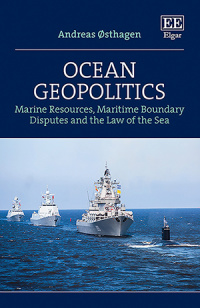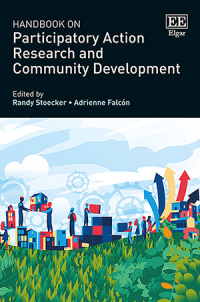Hardback
A Research Agenda for Small and Medium-Sized Towns
This is an open access title available under the terms of a CC BY-NC-ND 4.0 License. It is free to read, download and share on Elgaronline.com.
Exploring current debates on the topic, this book maps out an agenda for theory, research and practice about the role and function of small and medium-sized towns in various contexts and at different territorial scales. Chapters highlight new insights and approaches to studying small and medium-sized towns, moving beyond the ‘urban bias’ to provide nuanced thought on these spaces both in terms of their relation to larger cities, and in terms of implications related to their size.
Exploring current debates on the topic, this book maps out an agenda for theory, research and practice about the role and function of small and medium-sized towns in various contexts and at different territorial scales. Chapters highlight new insights and approaches to studying small and medium-sized towns, moving beyond the ‘urban bias’ to provide nuanced thought on these spaces both in terms of their relation to larger cities, and in terms of implications related to their size.
More Information
Critical Acclaim
Contributors
More Information
Elgar Research Agendas outline the future of research in a given area. Leading scholars are given the space to explore their subject in provocative ways, and map out the potential directions of travel. They are relevant but also visionary. Forward-looking and innovative, Elgar Research Agendas are an essential resource for PhD students, scholars and anybody who wants to be at the forefront of research.
Exploring current debates on the topic, this book maps out an agenda for theory, research and practice about the role and function of small and medium-sized towns in various contexts and at different territorial scales. Chapters highlight new insights and approaches to studying small and medium-sized towns, moving beyond the ‘urban bias’ to provide nuanced thought on these spaces both in terms of their relation to larger cities, and in terms of implications related to their size.
Contributions from top scholars in the field across a number of disciplines cover a broad range of relevant areas of study, including: socio-spatial identities, urbanization, suburbanization, resilience, innovation, entrepreneurship, industrial and tourism development and digitalization. The book concludes with an outline of the road ahead and a call for further theorizing.
Urban planning and human geography scholars will find this to be an invigorating read with contributions from scholars across urban planning, economic geography, tourism and public policy providing a holistic understanding of the topic.
Exploring current debates on the topic, this book maps out an agenda for theory, research and practice about the role and function of small and medium-sized towns in various contexts and at different territorial scales. Chapters highlight new insights and approaches to studying small and medium-sized towns, moving beyond the ‘urban bias’ to provide nuanced thought on these spaces both in terms of their relation to larger cities, and in terms of implications related to their size.
Contributions from top scholars in the field across a number of disciplines cover a broad range of relevant areas of study, including: socio-spatial identities, urbanization, suburbanization, resilience, innovation, entrepreneurship, industrial and tourism development and digitalization. The book concludes with an outline of the road ahead and a call for further theorizing.
Urban planning and human geography scholars will find this to be an invigorating read with contributions from scholars across urban planning, economic geography, tourism and public policy providing a holistic understanding of the topic.
Critical Acclaim
‘I’m so excited about this book! Small towns have long been an understudied topic in geography, sociology, economics and other disciplines. This book is an important step forward as it moves beyond the case-study approach to consider broader implications of technology, culture, and sustainability in these places.’
– Jennifer Mapes, Kent State University, US
‘There is considerable life, dynamism, opportunities and much potential to be tapped beyond the big city. But academic scholars have mostly overlooked this potential and ignored the role of towns. Mayer and Lazzeroni redress this wrong and provide the ultimate agenda for researching small- and medium-sized towns.’
– Andrés Rodríguez-Pose, London School of Economics, UK
‘This volume shows that while big cities often steal the limelight – either because of their national economic importance or the intensity of their social, economic and environmental problems – small and medium-sized cities are an important dimension of urbanization, with significant implications for economic development, quality of life, sustainability, and environmental quality.’
– Paul Knox, Virginia Tech, US
– Jennifer Mapes, Kent State University, US
‘There is considerable life, dynamism, opportunities and much potential to be tapped beyond the big city. But academic scholars have mostly overlooked this potential and ignored the role of towns. Mayer and Lazzeroni redress this wrong and provide the ultimate agenda for researching small- and medium-sized towns.’
– Andrés Rodríguez-Pose, London School of Economics, UK
‘This volume shows that while big cities often steal the limelight – either because of their national economic importance or the intensity of their social, economic and environmental problems – small and medium-sized cities are an important dimension of urbanization, with significant implications for economic development, quality of life, sustainability, and environmental quality.’
– Paul Knox, Virginia Tech, US
Contributors
贡献者包括:大卫,Timothy Beatley伯乐, Martijn Burger, Christophe Demazière, Dimitri Ioannides, David Kaufmann, Michela Lazzeroni, Heike Mayer, Chiara Rabbiosi, Evert Meijers, Arnault Morisson, Koen Salemink, Annett Steinführer, Stefan Wittwer





